Afghanistan Eleven Years And 2,000 American Deaths Later
The Afghanistan War is officially eleven years old today.
It was eleven years ago today, a mere 27 days after terrorists had struck the United States in New York City and Arlington, Virginia, that the United States began a military campaign in Afghanistan that continues to this day. Initially, the goal of the war was a two-fold effort to hunt down those who had plotted and carried out the September 11th attacks themselves and to dislodge al Qaeda and its Taliban protectors from a safe haven in Afghanistan. Eventually, that mission changed to one that involved building something resembling a democratic society in a nation that had never known such a thing in its history and where tribal loyalties often were more important than national ones, and to protect the Kabul regime from a domestic insurgency.
Eleven years later, we have in fact inflicted substantial damage on al Qaeda. They no longer have safe haven in Afghanistan, most of their top leadership has been captured, destroyed, or sent into hiding, and their spiritual and titular head died in a hail of Navy SEAL gunfire on May 1, 2011. At the same time, though, we can’t really show a similar level of success in the other aspect of our mission. Hamid Karzai’s hold on power outside Kabul remains precarious at best, the Taliban rebels remain a potent fighting force, and our efforts to train the Afghan military and police forces to defend their nation have been hampered by a rash of “Green on Blue” attacks wherein supposed Afghan allies have murdered American and other ISAF forces at an increasingly bloody pace. At the same time, we’ve lost 2,000 American men to this war and we’re just now beginning to learn of the costs that many of those who have served are paying in terms of PTSD and other ailments. The suicide rate among American troops, both in and out of Afghanistan, has increased at an alarming rate in recent years.
So here we stand at the start of the 12th year of America’s longest war with very little to show for it:
Nobody wants a repeat of the bloody ethnic fighting that followed the Soviet exit from Afghanistan in the 1990s — least of all 32-year-old Wahidullah who was crippled by a bullet that pierced his spine during the civil war.
Yet as the Afghan war began its 12th year on Sunday, fears loom that the country will again fracture along ethnic lines once international combat forces leave by the end of 2014.
“It was a very bad situation,” said Wahidullah, who was a teenager when he was wounded in the 1992-1996 civil war. “All these streets around here were full of bullet shells, burned tanks and vehicles,” he added, squinting into a setting sun that cast a golden glow on the bombed-out Darulaman Palace still standing in west Kabul not far from where he was wounded.
“People could not find bread or water, but rockets were everywhere,” said Wahidullah, who now hobbles around on red-handled crutches. He goes by one name only, as do many Afghans.
The dilapidated palace is a reminder of the horror of the civil war when rival factions — who had joined forces against Soviet fighters before they left in early 1989 — turned their guns on each other. Tens of thousands of civilians were killed.
Fed up with the bloodletting, the Afghan people longed for someone — anyone — who would restore peace and order. The Taliban did so.
But once in power, they imposed harsh Islamic laws that repressed women and they publicly executed, stoned and lashed people for alleged crimes and sexual misconduct. The Taliban also gave sanctuary to al-Qaida in the run-up to the Sept. 11, 2001 attacks on the U.S. When the Taliban refused to give up the al-Qaida leaders who orchestrated 9/11, the U.S. invaded on Oct. 7, 2001.
Eleven years later, Afghanistan remains divided and ethnic tension still simmers.
The Taliban, dominated by the ethnic Pashtun majority, have strongholds in the south. Ethnic minorities such as Tajiks, Hazaras and Uzbeks live predominantly in central and northern Afghanistan. The fear is that when international forces leave, minority groups will take up arms to prevent another Taliban takeover and that members of the Afghan security forces could walk off the government force and fight with their ethnic leaders.
Anxiety and confusion about what will happen after the foreign forces leave permeates every aspect of society. Political debate about an Afghanistan post-2014 is getting more vocal. Some political leaders threaten to take up arms while others preach progress, development and peace. Young Afghans with money and connections are trying to flee the country before 2014.
There also is mounting uncertainty about the upcoming transfer of power. At the same time that foreign troops are scheduled to complete their withdrawal in 2014, Afghans will go to the polls to elect a successor to President Hamid Karzai, who is barred by the constitution from running for a third term.
The Afghan people already view their government as weak and corrupt and those doubtful of a peaceful future say that if the upcoming presidential election is rigged and yields an illegitimate leader, civil war could erupt between ethnic groups backed by neighboring countries trying to influence Afghanistan’s future.
“Unfortunately in Afghanistan, we do not have any political unity,” said Gen. Sayed Hussain Anwari, a former governor of Kabul and Herat provinces who led fighters during the civil war.
It’s very easy to see Afghanistan plunging back into civil war after 2014. There’s no deal to be had with the Taliban, at least at the moment, and President Karzai has seemingly done very little to create any kind of national political movement that would lead to a democratically elected successor. Indeed, given the allegations of widespread election fraud in each of his elections, one has to wonder if Karzai even intends to give up power willingly. After all, it’s reportedly been a very lucrative position for him, his family, and his cronies. Viewing all of this from a distance, it would seem that the political future of Afghanistan is that Afghanistan has no political future. All of that leaves them vulnerable to not only civil war, but outside influence from nations like Pakistan and Iran.
So this is what we have after eleven years. Two thousand American soldiers dead. Billions of dollars spent. A nation that was already there pretty much bombed back into the Stone Age. And political instability in a nation that bred terrorism because it was politically unstable. Tell me again why this was a good idea?
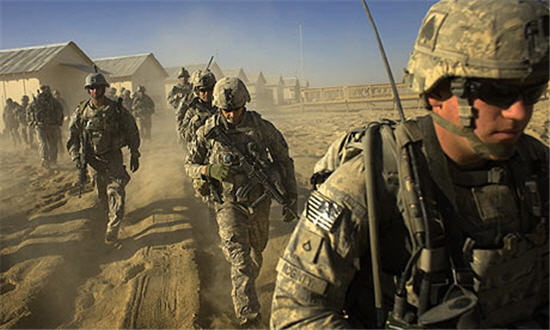

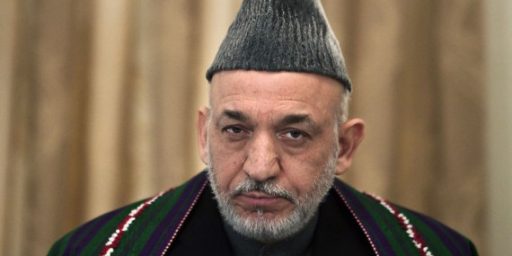
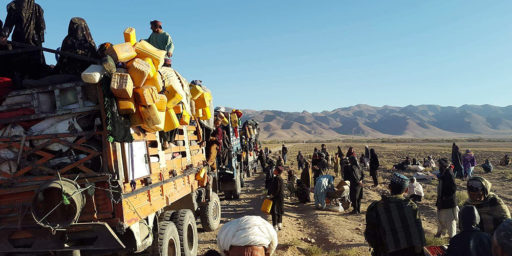

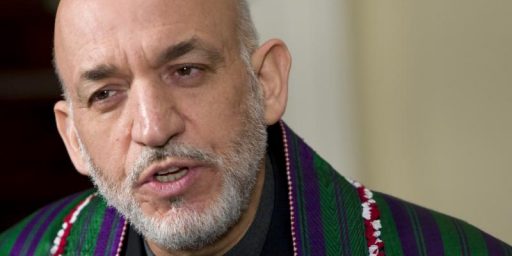
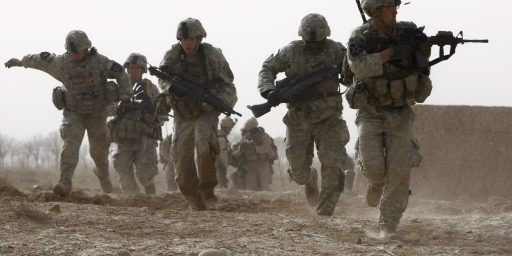
Kurt Eichenwald has a book out , 500 Days: Secrets and Lies in the Terror Wars. He spells out how the Bush administration was driven by panic and fear and reacted with incompetence. Obama has continued many of the fear driven incompetent policies because as we learned in Vietnam wars are much easier to start than to stop – it’s the politics. After Johnson realized the war in Vietnam could not be won 50.000 Americans died.
Could not agree more Doug. I do have one quibble:
Once we removed the Taliban from govt’ we were legally (according to the laws of war??? I heard something like this somewhere along the line) responsible for providing governance in Afghanistan. If not legally than morally. Hence, nation building. As much as I despise the Taliban I was never in favor of removing them from power. Plain and simply because I thought we would end up exactly where we are.
When Obama said Afghanistan was the war we should be fighting, not Iraq, I could only face palm. I understood why he said this just as I understood why Bush invaded. What I don’t understand is why is it so hard to take the long view?
Sometimes I wish for a time machine. If I could go back and show Bush, et al. what abandoning Afghanistan to focus on Iraq would cause, would it have made any difference?
I honestly don’t know. Maybe not. But if the effort and $$ that was expended on Iraq had instead been invested in Afghanistan, where would it be today?
@bookdragon:
I don’t know either. I doubt it would have made a difference in Afghanistan, but it might have in Iran. (not a misspelling)
The electoral pressure on Obama is not that he leave sooner, right?
If he’d faced a strong “bring them home” candidate, then I think we could expect an accelerated withdrawal.
As it is his real competition (and not Fantasy League candidates) faults him for being “too soft” even with all the war, drones, and bin Laden killing.
Shouldn’t the big question here be why Republicans won’t change the dynamic, and take “stay” pressure off?
@john personna:
Because the war is great cover for transfering tax money to private businesses, like military contracters, who in turn share a smidge of that money with Republican politicians?
Because Republicans love any policy of showing those brown people that white Americans are stronger than they are?
I am glad this futile war is winding down. I feel bad for the people of Afghanistan, but abstractly, distantly, almost so that it’s not even a true emotion. I feel much stronger about the 2000 dead Americans, and the thousands more who carry the scars.
Was it worth it? Not to me, but what am I going to tell them?
@Ron Beasley: I have always thought that Johnson ranks among the great leaders of this country, a man who dominated Washington for decades and towered over others. His foreign policy was not the best. Nixon was a lot better in that area, but it helps when you have Henry Kissinger along with you. The lesson of Vietnam is: have a plan to win, and a plan to leave. “To fail to plan is a plan to fail”.
For interesting comments by Johnson explaining the Vietnam policy, go to this site: http://www.youtube.com/watch?v=NOEH-xAMHRk&feature=related
(interviewed on 60 Minutes by Conkrite)
Why do our previous leaders always seem to look better and better? Maybe it is just me.
@Clanton: Johnson was a skilled and powerful leader but not a great leader. If you want to know about Johnson I suggest Reaching For Glory, the transcripts of the Johnson White House tapes.
As sad as it is, we generally waste the lives of soldiers — whether because the war was unnecessary, or because they were sent to war undertrained or poorly-equipped, or because their officers were inept and indifferent to their lives. That’s the norm, and not just for us, but for the world throughout human history.
20 years from now most Americans will have to be reminded that we fought wars in Iraq and Afghanistan. 40 years from now most Americans won’t recall even if reminded. The young will not be taught about either of these wars in school.
Ask a hundred Americans to list the wars of the 20th century and I doubt twenty will name Korea. Many if not most younger Americans don’t even know who we fought in World War 2. And what percentage of Americans know that we fought wars against the Seminole in Florida, or crushed the independence of the Philippines or invaded Mexico and made off with half their country?
It all goes down the memory hole. What we do remember is more myth than reality. And what is heartbreaking today becomes dusty fact in a few decades. Eventually tragedy becomes comedy — remember the books about the “leadership skills” of Genghis Khan?
That’s the way it goes. Probably someone should explain that to young people when they volunteer for service.
@Clanton: Great video, I was in my late teens when this was going on. Wayne Morse was a friend of the family and I remember my father and Senator Morse discussing the war. Since I was soon to be eligible to be canon fodder they discussed me as well.
@michael reynolds: The memory hole is a problem. The fact that war is profitable is the real problem. The same applies to the War On Drugs.
I think its a bit too easy to say that the war wasn’t a good idea, futile, etc. To a first approximation , ALL wars are messy, futile, costly affairs-and that even includes the Good One, WW2. You could just say that all WW2 did was delivery half of Europe to the Soviets for 50 years, and point to the horrific fire raids on Japan as the greatest un-prosecuted war crime of the 20th century, etc.
What exactly , would have the best response to 9-11?Ignoring it or just settling for a public condemnation of the act? That’s a bit too non-interventionist for me.
Invading and pulling out after a few months? The Taliban and al-Queda would be back within months and proclaiming victory over the Great Satan.
Doug and others don’t seem to like the drone war option, so how would we strike at them? Manned air strikes?Cruise missiles? Commando raids? From where?
Once you game out the options, its difficult to see any other option other than a long occupation of Afghanistan. The “libertarian ” option-just withdraw from the entire region- really games out to capitulation- al-Queda’s goal.
I realized the Afghanistan war had gone on too long when I looked at my eight-year-old son and realized that American soldiers and Marines who are dying in Afghanistan today were his age on 9/11.